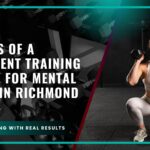When it comes to achieving lasting fitness results, the most successful personal trainers in Richmond understand that exercise alone isn’t enough. The transformation their clients experience extends far beyond the gym walls, encompassing comprehensive lifestyle modifications that create sustainable health improvements. These experienced fitness professionals recognize that true wellness requires a holistic approach that addresses sleep patterns, nutrition habits, stress management, and daily movement integration.
Richmond’s top trainers have observed countless clients struggle with yo-yo fitness results, only to discover that the missing piece wasn’t more intense workouts or stricter diets, but rather fundamental changes to their daily routines and mindset. The most effective trainers in the area have developed systematic approaches to guide their clients through these essential lifestyle transitions, creating frameworks that support long-term success rather than quick fixes.
The lifestyle recommendations from Richmond’s leading fitness professionals are grounded in both scientific research and practical experience with diverse client populations. These trainers work with busy professionals, parents juggling multiple responsibilities, seniors looking to maintain independence, and young adults establishing healthy habits for the first time. Through this varied experience, they’ve identified the most impactful lifestyle changes that consistently produce results across different demographics and life circumstances.
What sets Richmond trainers apart is their understanding of the local community’s unique challenges and opportunities. They recognize the specific obstacles their clients face, from long commutes to downtown Vancouver to the seasonal weather patterns that affect outdoor activity preferences. This local insight allows them to provide practical, actionable advice that clients can realistically implement within their existing life structures.
The lifestyle changes recommended by these professionals aren’t about complete life overhauls that prove unsustainable. Instead, they focus on incremental modifications that compound over time, creating powerful momentum toward improved health and fitness. These trainers have learned that the most successful clients are those who embrace gradual change and build new habits systematically, rather than attempting dramatic transformations that often lead to burnout and regression.
Key Takeaways
- Sleep optimization is fundamental: Richmond trainers consistently emphasize that quality sleep forms the foundation of all other health improvements, recommending 7-9 hours of consistent sleep with proper sleep hygiene practices.
- Nutrition timing matters as much as food choices: Successful trainers teach clients not just what to eat, but when to eat, focusing on meal timing that supports energy levels and workout performance throughout the day.
- Stress management directly impacts fitness results: The most effective trainers incorporate stress reduction techniques into their programs, recognizing that chronic stress undermines both physical performance and recovery.
- Daily movement integration beats sporadic intense sessions: Richmond fitness professionals advocate for consistent daily activity beyond scheduled workouts, encouraging clients to find natural movement opportunities throughout their regular routines.
- Hydration strategies extend beyond basic water intake: Professional trainers provide comprehensive hydration guidance that considers individual needs, activity levels, and environmental factors specific to the Richmond area.
- Social support systems accelerate progress: Experienced trainers help clients build accountability networks and modify social situations to support their health goals rather than undermine them.
- Environment design influences behavior: Top trainers teach clients how to structure their home and work environments to make healthy choices easier and remove barriers to consistent healthy behaviors.
- Recovery practices are non-negotiable: Richmond’s leading fitness professionals emphasize that recovery isn’t passive rest, but active practices including stretching, mobility work, and relaxation techniques that enhance overall program effectiveness.
Understanding the Holistic Approach to Fitness

Richmond’s most successful personal trainers have moved beyond the traditional model of simply prescribing exercise routines and basic nutritional guidelines. They’ve embraced a comprehensive understanding that sustainable fitness results require addressing the interconnected aspects of their clients’ daily lives. This holistic approach recognizes that physical health is deeply influenced by sleep quality, stress levels, social relationships, work environments, and mental well-being.
The evolution toward this comprehensive approach stems from years of observing client patterns and outcomes. Trainers noticed that clients who achieved the most dramatic and lasting results weren’t necessarily those who followed the most intense workout programs or strictest diets. Instead, the most successful clients were those who made thoughtful adjustments to multiple aspects of their lifestyle, creating an environment where healthy choices became natural and sustainable.
This understanding has led Richmond trainers to develop assessment processes that go far beyond physical fitness testing. They now evaluate their clients’ sleep patterns, work schedules, family dynamics, stress levels, and existing habits before designing any program. This comprehensive assessment allows them to identify the specific lifestyle factors that might support or hinder their clients’ progress, enabling them to provide targeted recommendations that address individual circumstances.
The holistic approach also recognizes that different life phases require different strategies. A new parent’s lifestyle modification needs differ significantly from those of a recent retiree or a young professional just starting their career. Richmond trainers have developed the expertise to adapt their recommendations to match their clients’ current life situations while maintaining focus on long-term health objectives.
Sleep Optimization and Recovery Strategies


The foundation of every successful fitness transformation begins with sleep optimization, according to Richmond’s leading personal trainers. These professionals have observed that clients who prioritize sleep quality consistently achieve better results in strength gains, weight management, and overall energy levels compared to those who neglect this crucial component. Sleep optimization goes far beyond simply getting eight hours of rest; it involves creating comprehensive sleep hygiene practices that support the body’s natural recovery and regeneration processes.
Richmond trainers typically begin sleep optimization by helping clients establish consistent sleep and wake times, even on weekends. This consistency helps regulate the body’s circadian rhythm, improving both sleep quality and daytime energy levels. They recommend creating a pre-sleep routine that begins 60-90 minutes before bedtime, involving activities that promote relaxation and signal to the body that it’s time to wind down. This might include dimming lights, avoiding screens, practicing gentle stretching, or engaging in calming activities like reading or meditation.
The sleep environment receives significant attention from professional trainers who understand its impact on recovery quality. They advise clients to optimize their bedroom temperature, typically keeping it between 65-68 degrees Fahrenheit, and to invest in blackout curtains or eye masks to eliminate light pollution. Many trainers also recommend evaluating mattress and pillow quality, as proper spinal alignment during sleep directly affects recovery and reduces the risk of developing pain or stiffness that could interfere with workout performance.
Recovery strategies extend beyond nighttime sleep to include active recovery practices throughout the day. Richmond trainers often introduce clients to power napping techniques for those whose schedules allow, typically recommending 10-20 minute naps in the early afternoon to boost energy without interfering with nighttime sleep. They also emphasize the importance of managing caffeine intake, usually suggesting a cutoff time of 2 PM to prevent interference with sleep quality, while recognizing that individual sensitivity varies.
Advanced recovery strategies recommended by experienced trainers include incorporating relaxation techniques such as progressive muscle relaxation, deep breathing exercises, or meditation practices. These techniques not only improve sleep quality but also help manage stress levels throughout the day, creating a positive cycle that supports both mental well-being and physical performance. For more information on how professional guidance can enhance your overall training success, our comprehensive approach to skill development demonstrates the importance of proper recovery in achieving fitness goals.
Nutritional Timing and Sustainable Eating Habits


Richmond’s most effective personal trainers have discovered that when clients eat often matters as much as what they eat. This understanding of nutritional timing has revolutionized how these professionals approach dietary recommendations, moving beyond simple calorie counting or food restriction to focus on strategic meal timing that supports energy levels, workout performance, and recovery. The goal is creating eating patterns that work synergistically with the client’s exercise routine and daily schedule.
Pre-workout nutrition timing receives particular attention from experienced trainers, who typically recommend eating a balanced meal 2-3 hours before exercise or a smaller snack 30-60 minutes prior to training. This timing allows for proper digestion while ensuring adequate fuel availability during the workout. The composition of these pre-workout meals or snacks usually emphasizes easily digestible carbohydrates paired with moderate protein, avoiding high-fat or high-fiber foods that might cause digestive discomfort during exercise.
Post-workout nutrition timing is equally crucial, with Richmond trainers typically recommending that clients consume a combination of protein and carbohydrates within 30-60 minutes after completing their workout. This timing window optimizes muscle protein synthesis and glycogen replenishment, supporting recovery and adaptation to training. Many trainers help their clients prepare convenient post-workout options that can be easily consumed even when schedules are tight or when training away from home.
Beyond workout-specific timing, successful trainers emphasize the importance of consistent meal timing throughout the day. They often recommend eating every 3-4 hours to maintain stable blood sugar levels and prevent extreme hunger that can lead to poor food choices. This approach helps clients avoid the energy crashes and cravings that often derail healthy eating efforts, creating a more sustainable approach to nutrition that supports long-term adherence.
Sustainable eating habits focus on gradual implementation rather than dramatic dietary overhauls. Richmond trainers typically introduce one or two nutritional changes at a time, allowing clients to master these modifications before adding additional complexity. This might begin with something as simple as adding a vegetable to each meal or establishing a consistent breakfast routine, then gradually expanding to include more sophisticated strategies like meal preparation or portion optimization. When working with qualified professionals, understanding proper trainer credentials ensures you receive evidence-based nutritional guidance that complements your fitness program.
Stress Management and Mental Health Integration
The most successful personal trainers in Richmond have recognized that stress management isn’t just a nice addition to fitness programs—it’s an essential component that directly impacts their clients’ ability to achieve and maintain results. Chronic stress elevates cortisol levels, which can interfere with muscle building, promote fat storage, disrupt sleep quality, and undermine motivation. These trainers have developed comprehensive strategies to help clients identify stress sources and implement effective management techniques that support their overall health objectives.
Stress identification begins with helping clients recognize both obvious and subtle stress sources in their daily lives. While major stressors like work deadlines or family conflicts are typically apparent, experienced trainers help clients identify less obvious stress contributors such as poor time management, perfectionist tendencies, or social media consumption patterns. This awareness allows clients to address stress proactively rather than simply reacting to its effects on their energy and motivation levels.
Exercise itself serves as a powerful stress management tool when properly programmed. Richmond trainers strategically design workouts that provide stress relief while building physical fitness, often incorporating elements like rhythmic movement, focused breathing, or mindful movement practices. They teach clients to view their workout time as protected stress-relief periods, creating mental associations between exercise and relaxation rather than additional pressure or obligation.
Breathing techniques receive significant emphasis from professional trainers who understand their immediate accessibility and effectiveness. Simple practices like box breathing (inhaling for four counts, holding for four, exhaling for four, holding for four) can be implemented anywhere and provide rapid stress relief. Many trainers incorporate breathing exercises directly into their sessions, teaching clients to use breath control during challenging exercises and then apply these techniques to stressful situations outside the gym.
Time management strategies form another crucial component of stress reduction recommendations. Richmond trainers often help clients restructure their schedules to include buffer time between activities, reduce over-commitment, and prioritize activities that align with their health goals. This might involve negotiating work schedules to accommodate consistent workout times, batch-preparing meals to reduce daily decision fatigue, or establishing boundaries around social commitments that conflict with healthy routines. Professional trainers who understand the local community can provide particularly valuable guidance in this area, which is why many clients benefit from working with experienced local professionals who understand the unique challenges of Richmond residents.
Daily Movement Integration and Activity Habits
Beyond scheduled workout sessions, Richmond’s leading personal trainers emphasize the critical importance of integrating movement throughout the entire day. This approach recognizes that human bodies are designed for regular movement and that prolonged periods of inactivity can undermine even the most well-designed exercise programs. The goal is creating a lifestyle where movement becomes natural and automatic, supporting overall health while complementing structured training sessions.
Workplace movement strategies receive particular attention, given that many Richmond residents work in sedentary office environments or have lengthy commutes to Vancouver. Trainers often recommend implementing movement breaks every 30-60 minutes, which might include simple desk stretches, walking meetings when possible, or using standing desks for portions of the workday. These micro-movements help maintain energy levels, reduce muscle tension, and improve circulation throughout the day.
Transportation choices present significant opportunities for daily movement integration. Many trainers encourage clients to identify portions of their commute that could involve walking or cycling, even if it’s just parking farther away or getting off public transit one stop early. For clients who drive to work, recommendations might include taking stairs instead of elevators, walking during lunch breaks, or organizing walking meetings with colleagues.
Household activity optimization transforms routine chores into movement opportunities. Richmond trainers often help clients reframe activities like gardening, cleaning, or home maintenance as valuable physical activity rather than obstacles to their fitness routine. They might suggest more active approaches to household tasks, such as doing calf raises while washing dishes or incorporating squats and lunges into cleaning routines.
Recreational movement integration focuses on finding enjoyable activities that don’t feel like formal exercise but contribute to overall activity levels. This might include weekend hiking in the nearby mountains, recreational sports leagues, dancing, or active hobbies like gardening or home improvement projects. The key is identifying activities that align with the client’s interests and lifestyle, making them more likely to be sustained long-term. For clients seeking comprehensive support in developing these habits, professional guidance from experienced trainers can provide the structure and accountability needed to successfully integrate more movement into daily life.
Environmental Design and Habit Formation
Richmond’s most successful personal trainers understand that willpower alone isn’t sufficient for creating lasting lifestyle changes. Instead, they focus on helping clients design their environments to make healthy choices easier and remove barriers to consistent healthy behaviors. This environmental design approach recognizes that our surroundings significantly influence our decisions, often at a subconscious level, making it crucial to structure physical spaces in ways that support health goals.
Home environment optimization begins with the kitchen, where trainers help clients organize their space to promote healthy eating habits. This typically involves placing nutritious foods in prominent, easily accessible locations while storing less healthy options in less convenient spots. Many trainers recommend preparing healthy snacks in advance and storing them at eye level in the refrigerator, while keeping fruits and vegetables visible on countertops. They also suggest organizing cooking tools and meal prep containers to make healthy meal preparation as convenient as possible.
Exercise equipment placement receives strategic consideration, with trainers advising clients to position workout gear in locations where they’ll serve as visual reminders and reduce barriers to exercise. This might mean keeping resistance bands near the television for commercial break exercises, placing yoga mats in bedrooms for morning stretching routines, or setting up a designated workout space that doesn’t require extensive setup time. The goal is eliminating the friction that often prevents people from following through on exercise intentions.
Digital environment design has become increasingly important as trainers recognize the impact of technology on their clients’ habits and mindset. They often recommend curating social media feeds to include motivational fitness content while unfollowing accounts that promote unhealthy comparison or negative self-talk. Many trainers also suggest using smartphone apps and notifications strategically, setting reminders for meal times, water intake, or movement breaks while limiting exposure to stress-inducing news or social media during evening hours.
Habit formation strategies focus on creating environmental cues that trigger desired behaviors automatically. Richmond trainers often help clients establish visual cues like laying out workout clothes the night before, setting up water bottles in prominent locations, or using meal prep containers that make healthy portion sizes obvious. They also emphasize the importance of linking new habits to existing routines, such as doing stretches immediately after brushing teeth or taking a short walk immediately after finishing work. These environmental and cue-based approaches create systems that support healthy choices even when motivation is low or schedules become hectic.
Prolific Health’s Comprehensive Lifestyle Approach
At Prolific Health, our experienced team of personal trainers in Richmond has developed a comprehensive approach to lifestyle modification that goes far beyond traditional exercise prescription. Our trainers understand that lasting fitness results require addressing the complete spectrum of factors that influence health and well-being, which is why we integrate lifestyle coaching into every client program. This holistic approach has consistently produced superior outcomes for our diverse clientele throughout the Richmond and Vancouver areas.
Our assessment process begins with a thorough evaluation of each client’s current lifestyle patterns, identifying both strengths to build upon and areas that may be hindering progress. We examine sleep quality, stress levels, daily routines, work schedules, family dynamics, and existing habits to create a complete picture of our client’s life context. This comprehensive understanding allows our trainers to provide personalized recommendations that fit realistically within each individual’s circumstances while supporting their health and fitness objectives.
The Prolific Health team specializes in creating sustainable change through gradual implementation and consistent support. Rather than overwhelming clients with dramatic lifestyle overhauls, our trainers introduce modifications systematically, allowing time for each change to become established before adding additional complexity. This approach has proven highly effective in creating lasting results, as clients develop confidence and momentum through successful implementation of manageable changes.
Our ongoing support system includes regular check-ins, progress monitoring, and adaptive program modifications to ensure that lifestyle recommendations remain relevant and effective as clients’ circumstances evolve. We understand that life is dynamic, and our approach adapts accordingly, helping clients navigate challenges like schedule changes, travel, family obligations, or seasonal variations while maintaining their commitment to healthy living. This flexibility and ongoing support distinguish our comprehensive approach from more rigid programs that often fail when real-life complications arise.
Frequently Asked Questions
What are the most important lifestyle changes Richmond trainers recommend first?
Most Richmond trainers prioritize sleep optimization and consistent meal timing as the foundational lifestyle changes. These modifications provide the energy and stability needed to successfully implement other healthy habits while supporting workout performance and recovery.
How long does it typically take to see results from lifestyle modifications?
While individual results vary, most clients begin experiencing improved energy levels and sleep quality within 2-3 weeks of implementing basic lifestyle changes. More significant physical changes typically become apparent after 6-8 weeks of consistent implementation.
Can lifestyle changes be effective without joining a gym?
Absolutely. Many lifestyle modifications focus on daily movement integration, stress management, and sleep optimization that don’t require gym membership. However, professional guidance can be valuable in developing effective strategies regardless of where exercise takes place.
What role does stress management play in fitness results?
Stress management is crucial because chronic stress elevates cortisol levels, which can interfere with muscle building, promote fat storage, disrupt sleep, and undermine motivation. Effective stress management techniques significantly enhance the effectiveness of exercise and nutrition efforts.
How do Richmond trainers help clients maintain lifestyle changes long-term?
Successful trainers focus on gradual implementation, environmental design, and building habits that become automatic. They also provide ongoing support and adapt recommendations as clients’ circumstances change, ensuring sustainability over time.
What nutritional timing strategies do trainers recommend for busy professionals?
Trainers typically recommend meal prep strategies, consistent meal timing every 3-4 hours, and strategic pre- and post-workout nutrition. They help clients develop convenient options that work within demanding schedules while supporting energy levels and workout performance.
How important is social support in implementing lifestyle changes?
Social support is extremely valuable, as it provides accountability, encouragement, and practical assistance. Many trainers help clients build support networks and navigate social situations that might challenge their health goals.
What environmental modifications make the biggest difference in maintaining healthy habits?
The most impactful modifications typically involve organizing kitchen spaces to promote healthy eating, positioning exercise equipment for easy access, and creating visual cues that trigger desired behaviors. Digital environment curation also plays an increasingly important role.
Conclusion
The lifestyle changes recommended by Richmond’s leading personal trainers represent a comprehensive approach to health and fitness that extends far beyond traditional exercise programming. These experienced professionals have recognized that sustainable results require addressing the interconnected aspects of daily life, including sleep optimization, stress management, nutritional timing, daily movement integration, and environmental design. Their systematic approach to lifestyle modification has consistently produced superior outcomes for clients across diverse demographics and life circumstances.
The success of this holistic approach lies in its emphasis on gradual implementation and practical sustainability. Rather than promoting dramatic overhauls that often lead to burnout and regression, Richmond trainers focus on creating manageable changes that build momentum over time. This methodology recognizes that lasting transformation occurs through consistent small improvements rather than unsustainable extreme measures.
For Richmond residents seeking to improve their health and fitness, the lifestyle recommendations from experienced local trainers provide a roadmap for creating lasting change. These modifications work synergistically to support not only physical improvements but also enhanced energy levels, better stress management, and improved overall quality of life. The investment in comprehensive lifestyle change, supported by professional guidance, consistently proves to be the most effective path toward achieving and maintaining health and fitness goals.
The future of personal training in Richmond continues to evolve toward this integrated approach, recognizing that true wellness encompasses all aspects of daily living. As more individuals experience the benefits of comprehensive lifestyle modification, this holistic methodology will likely become the standard for effective, sustainable health improvement in the community.




